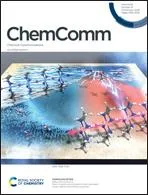Non-aqueous neptunium and plutonium redox behaviour in THF – access to a rare Np(iii) synthetic precursor
Literature Information
Nickolas H. Anderson, Suzanne C. Bart, Andrew J. Gaunt, Brian L. Scott
Solvent exchange of NpCl4(DME)2 with THF proceeds simply to yield NpCl4(THF)3, whereas PuCl4(DME)2 is unstable in THF, partially decomposing to the mixed valent [PuIIICl2(THF)5][PuIVCl5(THF)] salt. Reduction of NpCl4(THF)3 with CsC8 ultimately afforded NpCl3(py)4, the only example of a structurally characterized solvated Np(III) halide. The method demonstrates a route to a well-defined Np(III) starting material without the need to employ scarcely available Np metal.
Related Literature
IF 6.367
A new neodymium–phosphine compound for supercapacitors with long-term cycling stabilityIF 6.222
Building microsphere–nanosheet structures in N-doped carbon to improve its performance in the oxygen reduction reaction and vanadium redox flow batteriesIF 6.367
MnO/C cubo-polyhedrons derived from α-MnO2@ZIF-8 as anode materials for high-performance lithium-ion batteriesIF 6.367
Life cycle assessment of power-to-gas with biogas as the carbon sourceIF 6.367
An aminophosphonate ester ligand-containing platinum(ii) complex induces potent immunogenic cell death in vitro and elicits effective anti-tumour immune responses in vivoIF 6.222
Engineering of electrodeposited binder-free organic-nickel hydroxide based nanohybrids for energy storage and electrocatalytic alkaline water splittingIF 6.367
The dilemma between acid and base catalysis in the synthesis of benzimidazole from o-phenylenediamine and carbon dioxide‡IF 6.222
Insights into the mechanism of photosynthetic H2 evolution catalyzed by a heptacoordinate cobalt complexIF 6.367
Electrospun hydrogels for dynamic culture systems: advantages, progress, and opportunitiesIF 6.843
Source Journal
Chemical Communications

ChemComm publishes urgent research which is of outstanding significance and interest to experts in the field, while also appealing to the journal’s broad chemistry readership. Our communication format is ideally suited to short, urgent studies that are of such importance that they require accelerated publication. Our scope covers all topics in chemistry, and research at the interface of chemistry and other disciplines (such as materials science, nanoscience, physics, engineering and biology) where there is a significant novelty in the chemistry aspects. Major topic areas covered include: Analytical Chemistry Catalysis Chemical Biology and medicinal chemistry Computational Chemistry and Machine Learning Energy and sustainable chemistry Environmental Chemistry Green Chemistry Inorganic Chemistry Materials Chemistry Nanoscience Organic Chemistry Physical Chemistry Polymer Chemistry Supramolecular Chemistry
Recommended Compounds
Recommended Suppliers
 Heiza-Werkstätten Wärmetechnik GmbH
Heiza-Werkstätten Wärmetechnik GmbH GfL - Gesellschaft für Lärmbekämpfung mbH
GfL - Gesellschaft für Lärmbekämpfung mbH Zean Consultores
Zean Consultores Chemical Check GmbH
Chemical Check GmbH Vitaris AG
Vitaris AG Dalian Pruet Chemical Technology Co., Ltd.
Dalian Pruet Chemical Technology Co., Ltd. Changzhou Kewei Fine Chemical Co., Ltd.
Changzhou Kewei Fine Chemical Co., Ltd. Dongguan Hui Xin Innovative Material Technology Co., Ltd.
Dongguan Hui Xin Innovative Material Technology Co., Ltd. Jiande Yuanguang Plastic Equipment Factory
Jiande Yuanguang Plastic Equipment Factory Dongguan Koryada Chemical Technology Co., Ltd.
Dongguan Koryada Chemical Technology Co., Ltd.














